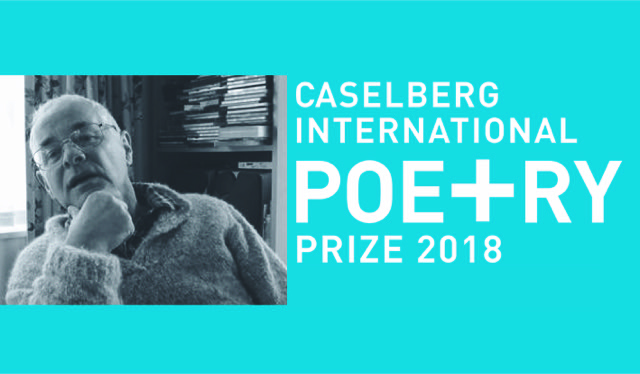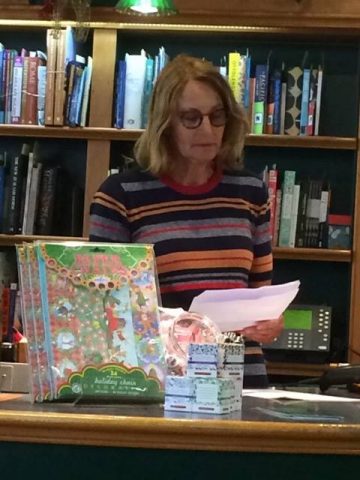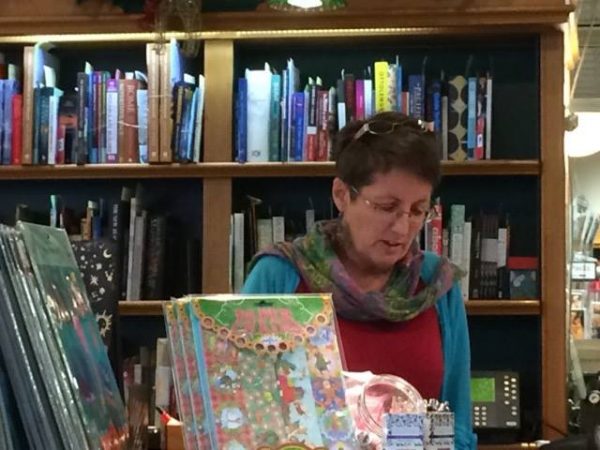2018 Poetry Prize | And the winner is…
We are thrilled to announce the winners of this year’s International Poetry Prize!
First place went to you can’t be here by Derek Schulz of Kapiti (pictured above), and Full Measure by Tony Beyer of Taranaki was placed second. The winner receives $500 and a week’s stay at the Caselberg House. The second placed poet receives $250. Both poems and the judges report will be published the November issue of Landfall.
The four Highly Commended entries were: Oh! Kee-o Kee-o and Memorial by Janet Newman (Horowhenua), The Castle by Sarah Scott (Wellington), and A Country Airing by Ruth Arnison (Dunedin). Their poems, along with the two winning entries and the judges report, will be published on the Caselberg Trust website in late November and read live by our winners at our upcoming awards night:
Caselberg International Poetry Prize 2018 Awards Night
University Book Shop
378 Great King Street, Dunedin
5.30pm, Thursday 29 November
Free to attend, all welcome!
Judge David Eggleton said of Schulz’s winning poem: “The poem ‘you can’t be here’ has a quicksilvery radiance; it’s like some febrile emanation of human consciousness itself. I applaud the wit and vividness of its dream-like scenario. In its zaniness and absurdity, it’s a kind of distillation of our current cultural condition, making it up as we go along in a just-in-time manner” and he noted that “Evanescent, spun out of thin air, it generates its own force-field; it lifts you up – and puts you down in a different place to where you were before”. You can download a full copy of the judge’s report on our website or find it in Landfall 236.
About the Winners:
Derek Schulz (2018 winner) is a poet, essayist and writer of fictions. ‘you can’t be here’ pays homage to friend and workmate Jean Webster. Arohanui Gem! Schulz’s work has appeared in Landfall, Sport, New Zealand Listener, Art NZ, and Architecture NZ among other publications, and his essay on Janet Frame “Secrets” appeared in the last edition of Landfall (Landfall 235).
Tony Beyer (2018 runner-up) operates out of Taranaki. New work has appeared this year in broadsheet, Landfall, Otoliths and Poetry Pacific. Beyer’s “Anchor Stone” (Cold Hub Press), was a finalist in the poetry category of the 2018 Ockham New Zealand Book Awards.
Highly commended:
Ruth Arnison is the editor of Poems in the Waiting Room (NZ), the instigator of Lilliput Libraries, and is responsible for the Poems on Steps project in Dunedin. Earlier this year she was awarded the QSM for services to poetry and literature.
Janet Newman is a PhD student in Creative Writing at Massey University. In 2017 she won the International Writers’ Workshop Kathleen Grattan Prize for a Sequence of Poems and in 2015 the New Zealand Poetry Society International Poetry Competition. Her poems have been published in a variety of journals.
Sarah Scott lives in Wellington. This year she won the ‘micro’ category in the NZ Flash Fiction competition and received Highly Commended in the Divine Muses Emerging Poets competition. Her recent work is in Landfall and Turbine.
David Eggleton’s Judge’s Report features in Landfall 236.
Derek Schulz of Kapiti travelled to Dunedin to read his winning poem ‘you can’t be here’ at our International Poetry Prize Awards Evening on Thursday 29 November 2018 at the University Book Shop. Read Derek’s poem below. We look forward to hosting our winner at the Caselberg House and we hope he is enjoying his prize of $500! Read all the winning poems in the current issue of Landfall #236.
you can’t be here
They dropped Gem on the road where it was continuing to bucket down, so I ducked out with the lobby umbrella and scooped her up from where no-one else was looking. She was feathery and light as a korowai, and had just finished dripping so there was nothing left inside, but I took her up to my room as if she was still here then held and held her, until I’d called her back. It took about a week, and another before she began to move; then cooked up her favorite invalid stew, kumara and puha. The puha was just where she said it would be, in the lobby planter, growing behind the dahlias. You wring it out like your underwear, under the bathroom tap. Screw and screw and screw it until the bitterness flows right out, then boil it up with the kumara, skins and all. Mash & feed, mash & feed, mash & feed, that had been her Māori regime and every day she seemed to glow a little lighter under it, until suddenly her eyes flared open. I asked her what she could see. -Is that really you? she said, as if she dare not make up her mind. Yet then… -Nothing, she decided. There’s nothing in here, grey clouds of it. -OK, I said. I need you to hold your breath. -OK what? -You heard. Pretend you’re under water, just like in the old days. See how long you can stay down. Just do it! She took one last gulp and did exactly as she was told, which was a real worry. She’d never done that before, though half an hour later she’d forgotten who she wasn’t, and gotten right back to herself. -Now tell me what you see. -Blue, she said. Everything’s turning blue. Should I have started breathing by now? It had worked. -You can’t be here, I said. They only take the train wrecks. When the M finds out they’ll send me away. -But I’m dark, she said. I’ve gone totally dark. It’s won me over. Her men had begun collecting on the far side of the bed. They wore blue-beards on their T’s, over purple Jagger jumpsuits, but she couldn’t see them anymore so I star-war’d them away with my sky-walker scarf. -Tripe, I said. You’re going home. Mitzy’s on her way. Mitz was her step-sister, the ugly one, and arrived in a Mirage around 8.30. She barreled through those front doors as if she’d only just heard the news, then drove it up the stairs to the front door, up here on the fourth floor, before busting right into the room. I could see she still blamed me for everything but never said a word, just bundled her into the car, then roared back down the hall. That’s Mitz for you. You wouldn’t think you could drive a Mirage around those hotel landing corners, but she made it look effortless. Then took the lift back down. Such a queer place this. No air to speak of
and everywhere you look has just been made up.
Janet Newman is from Horowhenua. She travelled to Dunedin to read her two highly commended poems at UBS for our International Poetry Awards evening on Thursday 29 November 2018. Read her two poems below.
Oh! Kee-o Kee-o
Last night, cutting potatoes,
butterflying chicken, a hawk
framed itself in my kitchen window,
its gentle rocking glide
interspersed with lazy wing-beats
so easy it was difficult to recall
that it was hunting for carrion
not flying freer than I felt
as I hovered over my chopping board
the way, next morning I was framed
in the windscreen,
easy behind the steering wheel
but hurrying to work,
another hawk––or perhaps the same hawk––
gripping road kill, slow to gain traction
in air without height, hefting the possum
with wing-beats
inaudible above the clamour
of the engine and Radio New Zealand’s
9am bird which unbelievably,
I thought afterwards,
was the mating
kee-o kee-o
of the swamp harrier,
a sound nothing like
the dumb thump
against the bumper.
Lines 4,5 and 23 are from http://nzbirdsonline.org.nz/species/swamp-harrier
Memorial
I was driving on Great South Road, Otahuhu,
that old garrison town, past the memorial
to Marmaduke Nixon, the colonial colonel whose
volunteer cavalry sacked Rangiaowhia in 1864.
He is buried there, far from the remains of those unnamed
villagers who burned in the whare. A Hobart stone obelisk
ascends the sky like the Phoenix Palm in my garden
where, beneath, karakas are multiplying.
I planted hinau, ngaio, koromiko
but the self-sown karakas are everywhere rising
through my mulch cover, my blood and bone.
The hoary palm conforms
to agapanthus borders, shelterbelts of pines,
in wind and calm drop fronds
with heavy spines, toxic thorns.
The chainsaw jags.
I could drill holes in its trunk,
inject 10mls glyphosate undiluted
or leave it:
majestic, ugly.
The gangly karakas wend to light, pour green
over the weft of fronds greying in shade beneath
the colossal plinth. If they could speak
with their throng of leaves they might chime,
old man, lie down with the land
in your own rotten time.
Wellington based poet Sarah Scott travelled to Dunedin to read her highly commended poem ‘The Castle’ at our International Poetry Prize Awards Event at UBS on Thursday 29 November 2018. Read the poem below.
The Castle
After the babies I felt a bit
Beaten back, caught in the
Crossfire of the past’s heated track.
Deeper was the day dropped on us and for
Ever, soft as a slowly falling
Feather. Finding we were finely flailing together.
Grind went the day in the
Hard house of hail.
I married my settler my sailor my
Jail. That sinking feeling
Kept leaving
Later, with its Monday
Mantra, its happy-rater. The motorway’s
Noisy nowhere faster was a
One-way ticket to the Never After, a
Pre-worn path with a losing lustre.
Quiet was the trip trap then, a real
Ruster. Rasping rawer in a suburban
Stupor. Stop to buy
Teabags for the trucked up trailer,
Under the spell of a tale derailing from a
Very long time ago.
Well, did you know that the slipper slipped its grip?
X-rated dreams in the traffic’s troubled blip. Our
Young yapping wildly in the no-parking
Zone, howling like wolves as we pull into Home.
Dunedin based poet read her highly commended poem ‘A country airing’ at our International Poetry Prize Awards Evening on Thursday 29 November 2018. Read Ruth’s poem below.
A Country Airing
Norwood St. draws her clay shoulder blades inwards,
a concave reaction to our spine tickling feet.
Down in the valley there’s a volley of barking.
Canine obedience classes will soon curtail that.
Portly pigeons perch precariously on fine lines,
their feather light tails, part of this balancing act.
Roll your own pouches, and KFC castoffs clog culverts.
Even the wind refuses to pick them up.
We pause, to catch air, unpack a remembered snack.
Rasping our open palms, her tongue scallops fat carrots inwards.
A distant hollow log reveals itself as a squashed newsprint roll,
a long way from the ODT – Dunedin’s divvy of the alphabet.
At the top, inflated with country air, we stand tall,
before readjusting packs, and reassuring lethargic legs,
it’s all downhill from here.
The runner up of the Caselberg International Poetry Prize was Tony Beyer, with his poem ‘Full Measure’, which you can read below. Carolyn McCurdie of Dunedin kindly read Tony’s poem in his absence at our awards night on Thursday 29 November 2018.
Full measure
they buried him with his mother’s people
whom he hadn’t seen since childhood
the best part of a century ago
but not having to shift to make room for him
they were as welcoming as ever
the wind that deposited grit
in the pitted parts of their gravestones
sang to him as well
of the bones of ancestors interred
in the soil of more distant islands
to his left a cousin of his grandfather’s
reposed under a snippet of Paul
as intellectual as religion got
among farmers horse fanciers
and founders of the nation’s railways
sequestered in another yard
the absent progenitor whose name
was hyphenated with a slur of surnames
paid for eternity in exile
the price of his spiritual curiosity
back in the approved dynastic plot
in dust at his feet three nieces lay
beheaded beneath a jack-knifed trailer
on the coast road driving their way
to an abruptly disbanded reunion
their names intertwined with flowers
on their monument are the names of flowers
recalling that descent too ceases with death
along with succession and breath
the prerequisites of inheritance
antidote to those who go about
with the suspicion that those in the cemetery
enjoyed the best of this land
its simpler rustic pleasures
its unquestioned entitlements





